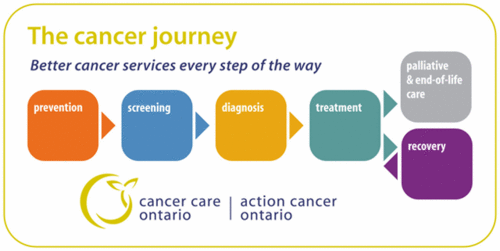



Continuum of Care
Cancer care occurs on a continuum from prevention to treatment to survivorship to palliation. The path is not linear and not everyone stops at each point or spends the same amount of time at each point.
Research and clinical expertise inform options and actions at each point in cancer care.

Where ever patients are on the continuum they have access to care and services to help them and to meet their needs.
Who are oncologists?
Oncologists are physicians and surgeons with specialized education and training in the diagnosis and management of cancer. For more on the specifics of medical, radiation and surgical oncology please see the companion modules.
Contrary to what you might first think, oncology is not actually depressing, it is an interesting and exciting field of medicine that provides the opportunity to:
work closely with patients and families in the clinical context
stay up to date with rapid developments in research
participate in clinical trials and research
engage at the community level in prevention, early detection and education programmes
contribute to knowledge and clinical practice from the genetic level to end of life care
offer patients hope and the best possibility of cure based on up to date research based practice
Oncologists practice medicine based in research, to provide good clinical results in the context of meaningful clinical relationships with patients and their loved ones.
Oncologists have been leaders in epidemiology. They have been able track advances in treatment and can provide patients with good historical data. Epidemiology enables oncologists to provide prognosis and response rates with confidence. This strong epidemiological base means that community education programmes can be targeted and supported with screening and early detection programmes like the Ontario Breast Screening Programme.
 Previous
Previous